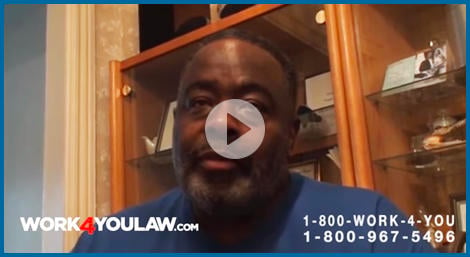Cleaning Crew Accidents

These window-washing crews often have to work from suspended scaffolding and lifts. It is crucial that these workers are provided with proper safety gear, training and supervision. Fatalities in this industry may be rare. But when accidents do occur, high-rise cleaning crewmembers can suffer catastrophic or even fatal injuries. New York law offers special protections for injured window washers and for the families of those who are killed on the job.
Window Cleaning in New York City
According to the New York Times, “taller and glassier” buildings have been the recent trend in New York City. This has resulted in more work for window washers. The Time Warner Center at Columbus Circle takes three months to clean with two crews and it could take several crews six to nine months to clean the New York by Gehry tower at 8 Spruce Street. All this additional work comes with an increased risk of accidents.
Cleaning crews face numerous dangers in any city, but working in New York City is particularly hazardous because of the many high rises and challenging weather conditions such as heavy winds, snow and ice. Only experienced workers who have received proper safety training should be allowed to work.
In many ways, these cleaning crew members are required to be as strong and as agile as rock climbers. In fact, window-washing companies often mention this requirement in their job advertisements and state it would be a suitable job for experienced rock climbers.
The Dangers of Window Cleaning in New York
There have been a number of serious injury accidents involving window cleaners in recent years in New York City. In December 2007, for example, two brothers plummeted 47 stories to the ground while cleaning windows on the Upper East Side. Only one of the brothers survived the fall. During that same year, a man was killed when he fell down 12 stories. In 2012, two window washers were stuck on a scaffold 40 stories above the Avenue of the Americas in Midtown. They were stranded until firefighters were able to cut through the glass to rescue them.
According to the International Window Cleaning Association, fatalities are quite rare in the window washing industry. A recent article in The New Yorker about window-washers noted that the work of washing windows in the United States is significantly safer than driving a cab. There was one fatality in the window-washing industry in 2011 and two in 2010. According to the U.S. Bureau of Labor Statistics (BLS), there were a total of 646 falls across all industries in 2010 of which 10 were in the window-washing industry. Out of those 10 falls, seven involved a fall to a lower level.
What Causes These Tragic Accidents?
There are several reasons why window-washing accidents may occur. These accidents are often preventable when the necessary safety precautions are taken. Here are some of the more common factors involved in window-washing accidents in New York City:
Bad weather: Wind, rain and snow can make window cleaning extremely challenging and dangerous. Supervisors must tell workers to stop work when the winds pick up. They should never be made to go out in inclement weather. For example, workers should be informed when a storm front is approaching. A sudden gust of wind at those heights can swing a scaffold out of control and cause the worker to fall. This is why window washers must be provided safety harnesses that secure them to the building if they slip and fall.
Scaffold accidents: A defective or poorly constructed scaffold can cause a worker to fall. The scaffold or lift used to carry the cleaning crews must be properly inspected before they start the cleaning work.
Defective harnesses or ropes: Window washers count on safety devices such as harnesses, lanyards, anchors and other accessories to keep them safe. When these products fail, the consequences can be disastrous. For instance, a defective rope or harness can contribute to a fatal fall.
Lack of safety devices: When window washers are sent up to do their jobs without the proper safety gear and accessories, the consequences can be devastating as well. It is the duty and responsibility of the employer to make sure that the workers have the safety equipment they need to do their jobs.
Lack of proper training: In addition to getting the training needed to do the job of cleaning high-rise windows, workers must be taught how to use safety devices. Proper supervision must be provided at work sites.
New York Window Washing Laws
Section 202 of New York Labor Law provides protections for workers engaged in window cleaning. Under this law, all building owners, property managers and companies that employ cleaning crews must require the use of proper safety devices to clean the exteriors of building. Also, the building owner must ensure the provision of structural features and anchors or other fixed devices on the building for the safety of the window washer. These features must be present for a window washer to be allowed to clean the building’s exterior. What this means is that the cleaning crews should not even be permitted to clean a building until proper protections are in place.
The provisions of this section, however, do not apply to multiple dwellings six stories or less in height; any building that is three stories or less in height in cities with a population of less than 40,000; and windows or exteriors of buildings that may be exempted.
New York’s Scaffold Law or Section 240 of the New York Labor Law and other sections of that law, protect window washers and other workers who work at heights. This law requires property owners, managers and contractors to provide workers with proper fall protection devices such as anchorage points, harnesses, nets and lifelines.
This and other sections of the Labor Law also place strict liability on the property owner and the general contractor if the worker is injured or dies as a result of not being properly protected. Such parties could be held liable in cases where a ladder or scaffold is faulty and causes the window washer to fall from higher elevations. This strict liability statute means that contractors and building owners can be held financially responsible for a window washer’s injuries even if the victim was partially responsible for the incident and for his or her own injuries, and even if the victim was the major (but not the sole) cause of the accident.
Window Washing Safety Standards
The International Window Cleaning Association (IWCA) developed safety standards to prevent accidents in this high-risk industry. These set of standards were approved by the American National Standards Institute (ANSI) in 2001 and establish guidelines with regard to providing a safer work environment for high-rise cleaning crews. Under these standards, building owners and managers must create a safe workplace for window washers and provide a written plan each year that addresses several safety measures including, but not limited to, inspection of permanent window-cleaning equipment installed on rooftops. Examples of such equipment include powered platforms, supports, anchors and permanent ladders.
Property owners and managers are also required to provide maintenance records and inspection documents for the window-cleaning contractor. Contractors are required to perform their services in compliance with local, state and federal laws and codes. Workers must be trained to safely operate all equipment used on the job. Certifications and proof of training should be available. Any equipment that is brought for the job should be designed, maintained and inspected according to industry standards.
Injuries Suffered by Cleaning Crews
Injuries suffered by cleaning crewmembers may range from simple strains and sprains to those that are life threatening. When workers fall from a higher elevation, they may suffer catastrophic or fatal injuries. Other types of injuries sustained by victims of window washing accidents include traumatic brain injuries, spinal cord trauma, bone fractures, internal organ damage, etc. Many suffer permanent injuries, which leave them disabled and unable to earn a livelihood. These types of serious injuries typically involve significant medical expenses, hospitalization costs and rehabilitative treatments. Some victims may require a lifetime of treatment and care, which could add up to millions of dollars. The devastating impact of such an injury is felt not only by the victim, but also his or her family members who must bear the responsibility of caring for the injured worker.
Compensation for Injured Workers
Injured high-rise cleaning crewmembers must report their injuries to their employers immediately and seek out medical attention right away. Injured workers are entitled to receive workers’ compensation benefits from their employers for medical expenses and a portion of lost wages. In addition to workers’ compensation, injured window washers may also be able to file what are known as “third-party claims” against entities other than employers, for significant money damages.
For example, if a window washer was injured in an accident caused by a defective scaffold, the worker may file a lawsuit against the manufacturer of the defective scaffold. If a dangerous condition on the property or building caused the accident, the property owner or building owner or manager can be held liable. If negligence on the part of a general contractor or sub-contractor caused the accident, then those entities may also be held liable.
Injured workers can receive compensation to cover damages including, but not limited to, medical expenses, lost wages and benefits, hospitalization, rehabilitative treatment, permanent injuries, disabilities, past and future pain and suffering, etc. The family of a deceased worker can file a wrongful death claim seeking compensation for lost future income, medical expenses, pain and suffering, funeral costs, etc.
It is important for injured workers or their families to refrain from rushing into settlements with insurance companies. It would be in victims’ best interests to first talk to an experienced personal injury lawyer who has successfully handled similar cases in New York City. On-the-job accident victims and their families will benefit from the services of a knowledgeable attorney who will fight for their rights. Once a settlement agreement is signed with the other party, victims may be unable to obtain any further compensation even if they incur additional medical and other expenses as a result of their injuries.
This is why it is important to take all possible factors into account before accepting a settlement. For example, a window washer who has suffered a catastrophic injury and is unable to return to the workforce can seek compensation for lost future income and benefits. If he or she is permanently injured or disabled, the person may be able to seek compensation for those damages as well. You would be well-advised to contact an experienced personal injury attorney right after your accident so that all of your rights are protected.
Contacting an Experienced Lawyer
If you or a loved one has been hurt in a New York City window-washing accident, the experienced New York personal injury attorneys at the Law Offices of Kenneth A. Wilhelm can help you better understand your legal rights and options. With more than 42 years of experience, we work tirelessly to help obtain the best possible compensation for injured victims or those who have lost a loved one due to someone else’s negligence. Our law firm has recovered many millions of dollars for injured people.
Please contact us TOLL FREE 24 hours a day, 7 days a week at 1-800-WORK-4-YOU (1-800-967-5496). WE CAN EVEN COME TO YOU. There is no attorneys’ fee unless we recover money for you. We can also help with personal injury cases in New Jersey, Connecticut, Pennsylvania, or Florida. If you have been seriously injured in any of the 50 U.S. states, please call us and we will try to help you with your case.
Other TOLL FREE phone numbers for us are:
1-800-RADIO-LAW, 1-888-WYPADEK, OR 1-800-LAS-LEYES
Please visit us at: http://www.WORK4YOULAW.com









